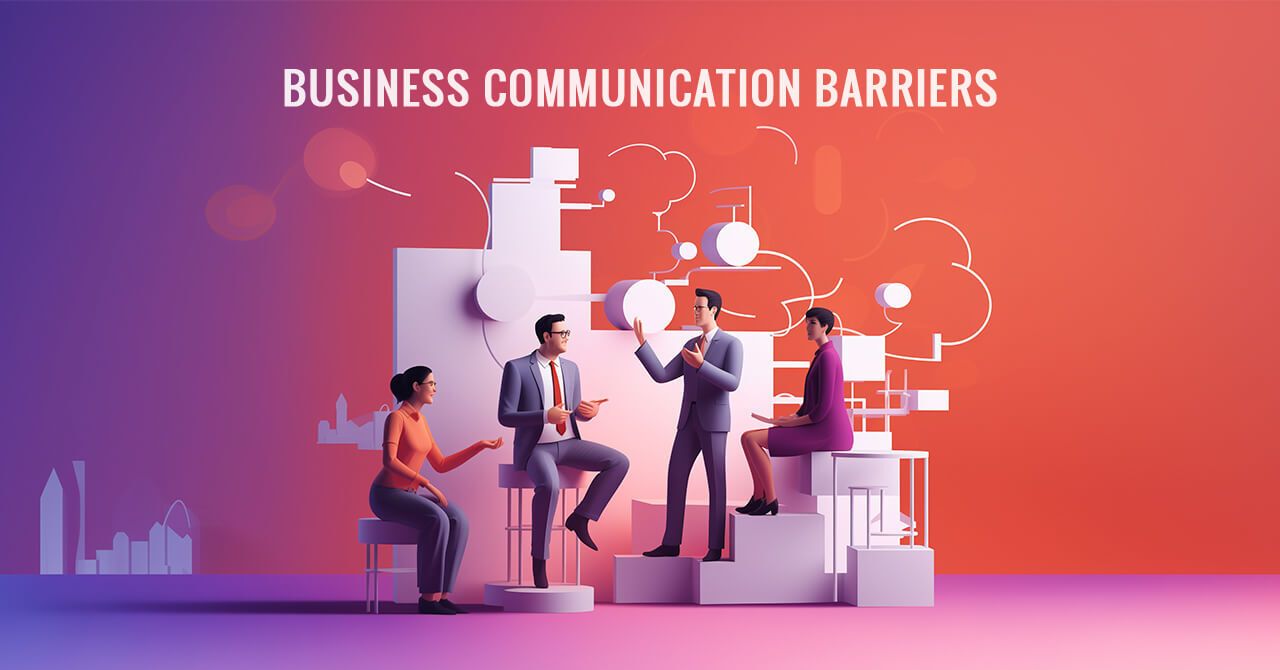
Barriers in Business Communication & How to Overcome Them
In business, effective communication isn’t only about minimizing conflicts; it is also a crucial factor in employee engagement, customer relationships, and profitability, to name a few.
Barriers in business communication can be defined as potential obstacles that employees face at work when attempting to communicate with their colleagues. One common barrier is language differences, but we’ll get to that later below.
You’ve probably heard that companies that practice effective communication at the workplace produce significant returns to stakeholders. Yes, and it’s also true that barriers to communication in business lead to poor productivity, low team morale, and below-par customer service.
We don’t often hear about this stinging truth, but misunderstandings at the workplace due to lack of clarity when communicating cost companies millions of revenue and important shareholders every year.
The power of effective communication in business
We all know how important communication is, but the skills are quite demanding to acquire and implement at work.
In business, effective communication isn’t only about minimizing conflicts, although it’s among the top benefits of communicating effectively. It is also a crucial factor in employee engagement, customer relationships, and profitability, to name a few.
Effective communication in business (or, let’s just say, at work) is very important since it promotes team morale and engagement. It is key to better teamwork and cooperation—and helps drive better outcomes for your business.
Understanding the 4 main types of business communication
With all the information available online, I’m certain that you already know that communication is the backbone of a successful company. Without it, I don’t see any way your brand can thrive, let alone survive.
It is, therefore, crucial for brands to understand and apply several types of business communication to get the communication in the company right.
Essentially, companies rely on different forms of business communication for successful interactions, whether that’s within or outside the organization. The strategy and chosen form of communication depend on different scenarios and shareholders.
Learning about the 4 types of business communication gives you what you need to plan and strategize communication within your business more effectively. It sets your brand up for success with increased clarity, better team and customer relationships, and greater success.
4 types (or forms) of business communication
Let’s now explore the four types or forms of business communication your company can adapt depending on varying scenarios.
Internal communication
In brief, internal communication keeps everyone within the organization informed, from the CEO to the rest of the company staff, including the cook, if there’s one.
It shares info about the organization so everyone can do (or perform) their duties well. Its main purpose is to provide a smooth flow of info between departments and colleagues. Strong internal communication nurtures organizational culture and establishes solid employee engagement.
External communication
This is when a business shares (or exchanges) information about its products, services, or plans with the outside world.
This could be its clients, external stakeholders, suppliers, other companies, or the general public. The main focus is to establish trust and a strong relationship between your company and everyone you interact with externally.
Aside from promoting your brand’s image and establishing a reputation with the community, you can also communicate externally to inform the public about what’s happening in your company.
Verbal communication
Just as it sounds, verbal communication in business is when we use speech to pass information about the business to its audience.
In business, you may be required to employ your verbal communication skills to explain or share your points during a meeting, make presentations, phonecalls, or engage in productive conversations with your teammates.
Aside from the typical requirements of a job opening, most businesses and recruiters today give high priority to candidates with outstanding verbal communication skills. They have more confidence in such candidates because they can help the company with formal presentations, networking, and negotiations with confidence.
Written communication
In business, written communication refers to the message that you share through the written word, standing as a permanent record of the information or idea. These could be emails, letters, reports, or memos.
Written communication skills are very demanding as they help with formality, communicating the message with clarity, and creating a lasting record of company interactions with stakeholders.
One notable advantage of this form of business communication is that it helps a lot when it comes to laying down principles, company policies, and rules for organizational functioning.
Identifying barriers to effective communication in business
Effective communication is the cornerstone of the success of every business. But despite our best intentions, various communication barriers often hinder smooth interactions within the workplace.
We are talking of things like, lack of clarity, poor listening skills, language differences, cultural barriers, and hierarchical challenges, to name a few.
Identifying and overcoming such communication barriers is crucial for promoting a happier, collaborative team and a productive work environment.
Let’s explore these barriers to communication in business and identify practical solutions (or ways to overcome them) to ensure a seamless flow of information.
Lack of clarity in message delivery
One of the primary barriers in business communication is the lack of clarity when conveying the message. In fact, it’s very common when communicating in a language you don’t understand so well.
When information is not clear enough, it can potentially lead to misunderstandings and confusion among the staff. Even frustrations and conflicts may arise as a result. To address this, you should always strive for clarity in your communication by using concise and straightforward language.
Always think of your audience first. Think about their level of understanding of the language you’re communicating in, and avoid using difficult words.
Make it a habit to break down complex ideas into simple, understandable components to ensure that your message is easily digestible for everyone. Also, pay attention to body language and tone of voice as they usually bear more meaning than the spoken words.
LiveXP offers a corporate language training program for companies. With the help of 1-on-1 lessons with tutors of a chosen language, your employees will learn a second language and communicate with others effectively. The lessons will help them identify the audience, expand their vocabulary to deliver the message, practice communication skills and pronunciation. The main benefit for the company here is it receives more skilled employees and effective communication.
Poor listening skills (or failing to listen)
Failing to listen while your colleagues are talking is yet another top barrier in business communication. In some cases, little knowledge of the language being used is often the culprit.
Effective communication is a two-way street (and poor listening skills can limit the exchange of ideas). Oftentimes, people may be so focused on formulating their response that they just miss crucial details in the message.
Failing to listen can cause you to miss important information and/or signals that could help you understand a situation better and come up with a strong response.
To some people, overcoming this type of business communication barrier can be as easy as actively and carefully listening while others are talking and demonstrating genuine interest in what they are saying. To others, it can be as simple as learning the language and non-verbal cues the speaker is using.
Developing strong listening skills fosters a culture of understanding and cooperation within the organization, so keep that on your checklist, and you just might save your company from losing important business and top employees.
On LiveXP, your employees can also practice their listening skills when learning with a tutor. They can let the tutor know what kind of skills they want to work on so that the tutor can prepare a personalized lesson plan for the specific employee and help them reach their goals.
Language differences
In a diverse workplace, varying cultural backgrounds and languages can pose significant challenges to effective business communication. Misinterpretations (and misunderstandings) may arise due to language barriers.
You can be really good at your job or even be part of an awesome team. But I tell you what, not understanding or not being fluent enough in the official language of your company can cost you and the company a lot.
If you or your employees can’t speak or adapt quickly to the official language your company does its business, then it’s going to be hard to achieve your milestones.
To address this, promote cultural sensitivity within the organization, provide language training when necessary, and encourage open discussions about different communication styles. Embracing diversity enhances communication effectiveness and enriches the overall workplace experience.
Cultural barriers
People from different places or different cultural backgrounds have varying ways of sharing information. I mean, apart from language differences, we also share or convey messages with unique symbols and gestures, which are not universal.
When gestures are part of communication, people with discrete origins may not be able to understand the message. This is one of the reasons some people end up giving less meaningful feedback, which may affect the communication exchange even further.
Notably, not acknowledging cultural distinctions might discourage the other guy and result in misunderstandings. Using team-building activities is therefore crucial, as they effectively eliminate cultural barriers among team members.
The language learning platform LiveXP has so far proven to be very beneficial as it provides corporate language training. With several professional tutors from different parts of the world, you are sure to find a tutor who can teach you the language, culture, and meaning of symbols and gestures that are unique to the specific community.
Help your employees navigate in different languages and cultures for your company’s best results.
Benefit from LiveXP’s corporate language training program.
Hierarchical challenges
Within some organizations, the existence of hierarchical structures may lead to bottlenecks in communication, as employees might hesitate to convey their ideas or concerns to higher-ups, ultimately causing a lack of transparency.
To address these hierarchical barriers effectively, it’s crucial to cultivate a culture of inclusive and open communication where every team member feels empowered to voice their opinions.
To implement this, you may want to consider conducting regular feedback sessions to provide a structured platform for team members to express their thoughts freely. You can also create channels for anonymous input, which allows everyone to share their thoughts without fear of repercussions.
This approach ensures that everyone’s perspective and/or viewpoint is not only heard but also considered in decision-making processes, which encourages a more collaborative and transparent work environment.
Enhancing communication in business and overcoming potential barriers
Getting rid of business communication barriers extends beyond current improvements within your organization.
It involves creating a pathway for both your teams and brand to expand effortlessly and endure sustainably in the future. While the tips mentioned earlier can help with this transformation, practicing the language the company uses is essential for maintaining long-term success.
At LiveXP, there are a bunch of tutors who focus mainly on helping employees improve their business English communication skills. They make the best speakers out of HRs, managers, CEOs, and other company staff. But why should one choose LiveXP when numerous other options are available online?
While you may have or may come across other interesting language apps like Preply, Lingoda, or iTalki, you may want to take a sharp look at the benefits employees enjoy with LiveXP to understand why most startups consider it their go-to platform for mastering business English:
- Effective 1-on-1 learning when the tutor’s attention is all yours.
- Flexible lesson scheduling, rescheduling, and cancellation.
- Tutors with different accents from around the world.
- You can learn with several tutors at the same time within one subscription.
- Word Trainer to learn vocabulary in the most effective way with the help of the spaced repetition method.
And that’s just a few of them. Let’s now look at the benefits your company can enjoy with LiveXP:
- You pay only for “active” learners, plus unused lessons don’t expire.
- There’s a dashboard where HRs can track the progress of every employee.
- You get a personal assistance manager who can even go that extra mile when you get stuck with some work.
- Simple billing.
For more information, don’t hesitate to visit the home page or contact LiveXP through the channels provided.
Final thoughts
Effective communication enables teams to collaborate on shared objectives and builds strong connections with clients and stakeholders.
While it’s relatively important, as we have learned above, barriers in business communication can hinder the smooth exchange of information and cause confusion among teammates. Being able to identify and address them promptly can ensure success for your organization.
By promoting clarity, improving listening skills, embracing diversity, and dismantling hierarchical barriers, your business can cultivate a communication-friendly environment. Now go save your brand, or go here to explore the corporate language training.
I'm Ronny Okumu with over 7 years of professional writing. Learning new things is something I truly enjoy. And if I meet a new topic, I just spend some time researching until I can write about it.

